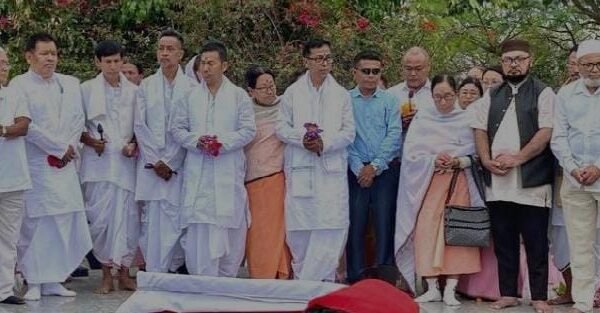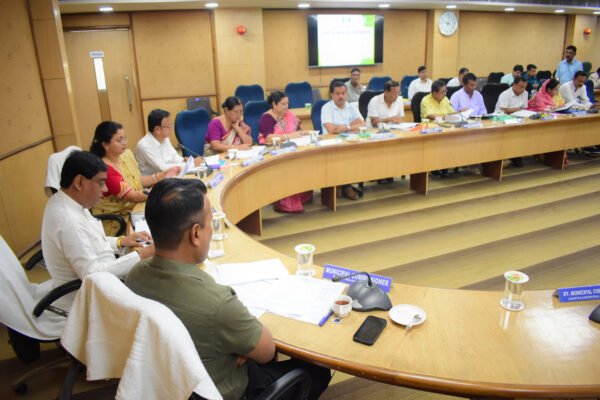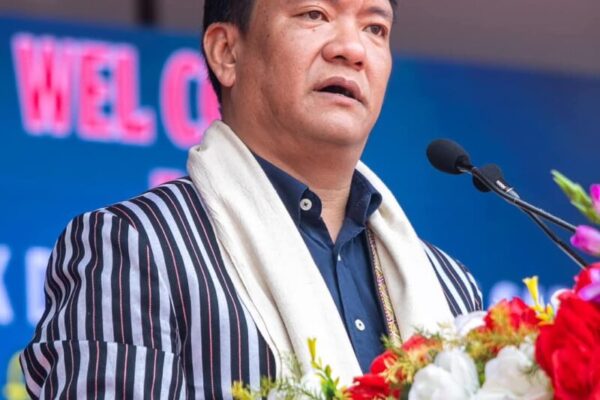- Loreni Tsanglao, NET Correspondent, Nagaland
The Agriculture Production Commissioner (APC), Nagaland, Y. Kikheto Sema IAS on March 9, 2022 attended the 13th Bio-Diversity Festival as the guest of honor organized by the North East Network (NEN) at NEN Resource Centre, Chizami, Phek on the theme “Embracing biodiversity for well being”.
He was accompanied by Additional Secretary, Agriculture Department, Sachin Jaiswal, IAS, and a host of officers from Agri and Allied departments including some intern students from Nagaland University : School of Agricultural Sciences and Rural Development (NU:SASRD), Medziphema. The program was also attended by various civil society organizations including public leaders of the Phek district.
Sema praised the efforts of North East Network’s (NEN) in protecting and preserving our two most valuable resources : nature and people. He stated that the Non-Governmental Organizations (NGOs)’ combined impact has likely resulted in a better understanding of biodiversity and natural resource preservation in the northeastern states.
During his recent visit to Noklak, the APC remarked that he was impressed by their footprints in the District, motivating and encouraging women to preserve seeds and multiply, serving as the best seed-keepers; and urged their organization to support actions to maintain and protect indigenous plant resources, as well as nutri-cereals such as millets, jobs tears, and pulses like as soya bean, which have large international markets.
He announced that 2023 will be designated as the “Year of Millets” and suggested that indigenous food products such as “Axone,” “Anishe,” and fine dried bamboo shoots apply for a Geographical Indication (GI) tag.
The North-Eastern states have been able to conserve a considerable amount of their biodiversity, possibly due to long years of seclusion and challenging terrain, according to Sema, but they are now under increasing pressure to unleash their riches for economic development.
Any development strategy that does not include environmental safeguards, will cause lasting damage to the land; he claimed.
He claimed that in Nagaland, commercial exploitation of forests is expanding to supplement the income of the rural population, resulting in the deterioration of natural resources and biodiversity.
Sema went on to say that Jhum agriculture, which accounts for 73 percent of total cultivation, is one of the causes of forest degradation, and he emphasized the necessity for long-term restoration and rejuvenation of the Jhum area in order to restore forests and conserve biodiversity in the state.
He advocated a thorough road map for the state, as well as each district and community, incorporating the Agri and Allied Departments for adequate demarcation of conservation and cultivated areas for balanced biodiversity management and climate change mitigation.
He was a major proponent of keeping the topmost portion of the forest mountains as catchment regions, and he pushed people to use native seeds rather than commercialized seeds.
Sema also urged NGOs, Farmer Producer Organizations (FPOs), and Farmers Interest Groups (FIGs) to apply for more than government subsidies and grants, noting that a new scheme dubbed the Agriculture Infrastructure Fund (AIF) focusing on post-harvest infrastructure is in the works, with the centre providing interest-free loans through National Bank for Agriculture and Rural Development (NABARD) and banks.
He also mentioned that the Prime Minister and Finance Minister had a virtual meeting the day before, when they discussed post-harvest infrastructure.
While praising women, he stated that Naga women play a significant part in farming, from planting to selling food in marketplaces, hence altering the rural people’s socio-economic situation.
He also mentioned the Organic AC Market in Dimapur, a project of Minister of Agriculture G. Kaito Aye, which has sold 330 MT of surplus produce purchased by NSAMB from various regions of the state, with the largest consignment coming from Phek District.
Tamara Law Goswami gave the keynote presentation, emphasising how humanity’s relationship with the environment is shattered. According to her, the Pandemic has highlighted how vulnerable human health is, with women being the first to be affected. She conveyed her gratitude to all stakeholders, particularly the government, led by the APC and the Agri and Allied Departments, as well as local farmers from all across Nagaland, for attending the event.
The Heritage Seed Exchange, which took place amongst women farmers from different communities in Nagaland, was the main focus of this event.









